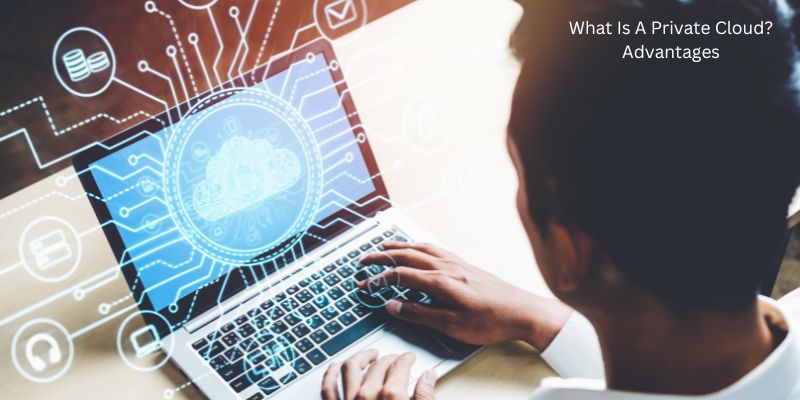An company can only use a private cloud, which is a type of cloud service. A private cloud enables an enterprise to take use of cloud computing features without having to share resources with other businesses. In this article, with newtimezz.com, let’s find out some useful information about what is a private cloud?
Contents
1. What Is A Private Cloud?

What Is A Private Cloud? A private cloud is a cloud computing infrastructure that is exclusively used by one client. This strategy combines many of the benefits of cloud computing with the security and administration of on-premises IT infrastructure.
A “private cloud” is a cloud computing system in which all hardware and software resources are exclusively allocated to and used by a single customer (also known as an internal cloud or corporate cloud). Private clouds combine on-premises infrastructure’s access control, security, and resource customization with many of the benefits of cloud computing, such as scalability, elasticity and service delivery’s simplicity.
Because private cloud is a simpler (or the only option) to satisfy their regulatory compliance standards, many businesses prefer it to public cloud (cloud computing services offered via infrastructure shared by several customers). Others choose for private clouds because their workloads involve sensitive information such as financial data, medical records, intellectual property, and personally identifiable information (PII).
An business offers itself the ability to quickly shift workloads to the public cloud or operate them in a hybrid cloud (mixed private and public cloud) context whenever they’re ready by creating private cloud architecture in accordance with cloud native principles.
2. What Is A Private Cloud? How Is It Work?
Private cloud is a single-tenant system, which means that only one client has isolated access to all resources. Private clouds are frequently housed at the customer’s data center on-site. However, private clouds can also be constructed on rented infrastructure located in an offsite data center or hosted on the infrastructure of a different cloud provider. The consumer might handle everything themselves or outsource partial or complete management to a service provider. Management methods also differ.
3. What Is A Private Cloud? Advantages

Building a private cloud enables all businesses—even those in highly regulated industries—to take advantage of numerous cloud computing advantages without giving up security, control, or personalization. Private cloud benefits in particular include the following:
- Complete discretion over software and hardware selections. Customers of private clouds are able to buy the hardware and software they choose rather than what the cloud provider sells.
- Freedom to alter hardware and software whatever you like. Customers of private clouds have complete control over server customization, and they may alter software as necessary using add-ons or through custom development.
- Greater security and access control visibility due to the fact that all workloads are run behind the customers’ own firewall.
- Full enforcement of regulatory standards compliance. Private cloud users are not need to depend on the cloud service provider’s assurances of compliance with laws and standards.
Private clouds have a greater cost, which might include the price of buying and installing new hardware and software as well as the price of operating it (which can require employing more IT professionals). Another drawback is a degree of flexibility that is rather limited—once a company invests in software and hardware for its private cloud, expanding its capacity or adding new features requires further investments. These drawbacks can be somewhat mitigated by managed cloud services and virtual private clouds (see below).
4. What Is A Private Cloud? Architecture

With the exception of the single-tenant design, private clouds are based on the same technologies as other clouds. These technologies allow the customer to provision and configure virtual machines and computing resources as needed in order to quickly and effortlessly (or even automatically) scale in response to spikes in use and traffic, implement redundancy for high availability, and maximize resource utilization.
The following are some of these technologies:
- Through virtualization, IT resources can be detached from the underlying physical hardware and gathered into unrestricted resource pools of computing, memory, storage, and networking capacity that can then be divided among numerous virtual machines (VMs), boxes, or other virtualized IT system components. Virtualization makes it possible for the cloud to be scaled, agile, and elastic by eliminating the limitations of physical hardware and allowing for efficient sharing of hardware among different users and applications.
- Administrators have centralized control over the network’s components and the apps that use it thanks to management software. This enables the private cloud environment to be optimized for safety, accessibility, and resource use.
- Tasks that would typically need human labor and repetition, including server setup and integrations, may be completed more quickly with automation. Delivery of self-service resources is made feasible through automation, which decreases the need for human interaction.
- DevOps, containers, and microservices are a few examples of cloud native application architectures and methods that private cloud users may embrace to increase efficiency and flexibility as well as prepare for a future shift to a public cloud or hybrid cloud environment.
Conclusion
A private cloud is an online service that is available only to one enterprise. A private cloud allows a business to reap the advantages of cloud computing without having to share resources with other enterprises. I hope you found this article informative about the answer to the question: what is a private cloud? is useful. Have a good day!





